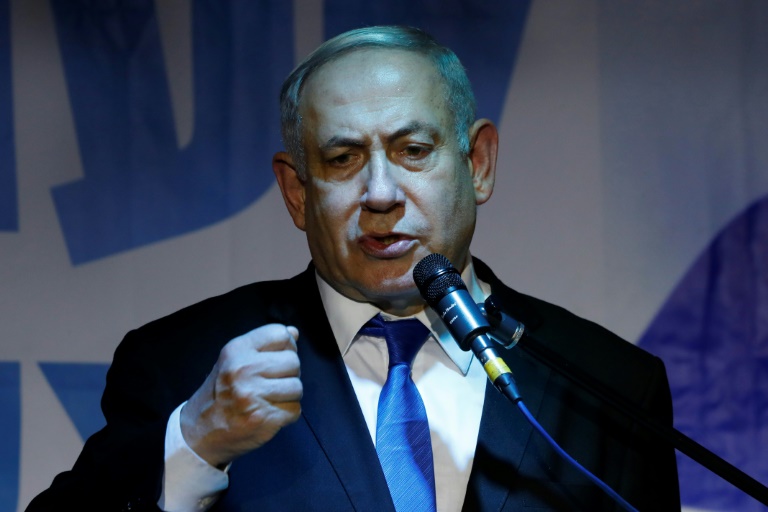Benjamin Netanyahu and rival Gideon Saar urged supporters to vote in the Likud party’s leadership election Thursday, with the embattled Israeli Prime Minister fighting for his political future.
Likud’s roughly 116,000 eligible voters have until 11 pm (2100 GMT) to choose between Netanyahu and Saar, in a primary hit by low turnout due in part to bad weather.
The result is expected early Friday morning.
A defeat for Netanyahu, Israel’s longest-serving premier, would be a shock, but even a relatively close victory could weaken his influence over the conservative party he has dominated for 20 years.
After a decade in power, he has recently been damaged by a series of corruption indictments.
Following months of political stalemate, the 70-year-old also faces a third general election within 12 months early next year — but only if he first defeats his challenger.
With storms lashing the country, only 30 percent of party members had voted with five hours remaining, according to Likud figures, prompting Netanyahu to issue a plea.
“Everything is within reach, but only if you get out to vote,” he said on Twitter.
“The low percentage of turnout hurts us.”
His Facebook page showed a live video of him hitting the phones calling voters.
 AFP / JACK GUEZGideon Saar arrives to cast his ballot during a Likud party primary election vote in Tel Aviv
AFP / JACK GUEZGideon Saar arrives to cast his ballot during a Likud party primary election vote in Tel AvivSaar, 53, a former interior and education minister, is seen as slightly to the right of Netanyahu and has called for an even more hawkish policy towards the Palestinians.
His challenger Saar called it a “fateful day” for the party and the country, speaking as he went to vote near Tel Aviv.
“We can win today and embark on a new path, which will enable us to form a strong and stable government,” he said.
Netanyahu cast his vote in a booth established in his residence, while Saar visited a polling station near the commercial capital Tel Aviv.
– ‘Vote overwhelmingly’ –
The ever-present Israel-Palestinian conflict loomed over the poll.
On Wednesday evening Netanyahu was rushed off stage at a campaign event in the southern city of Ashkelon, near Gaza, after alarms indicating incoming fire from the Palestinian enclave.
At a polling station in Jerusalem’s Kiryat Moshe neighbourhood, Rami David said he had voted for Saar because “he would give Likud a new image”.
Read Also: Cost Of UK Royals Back In Spotlight After Queen’s Year
Nathan Moati, 26, said he backed Netanyahu and didn’t think supporters were concerned by the indictment.
“The most important thing is to vote overwhelmingly,” he said, adding that he hoped for an 80-20 percent majority for Netanyahu.
Stephan Miller, a pollster who has worked on multiple Israeli campaigns, said whatever the result “Netanyahu can only lose” because “it will be the first time in 10 years that a group of voters on the right explicitly express their desire to get rid of Netanyahu”.
The election comes after a troubled year for Israeli politics and the premier.
 AFP/File / JACK GUEZFormer interior minister Gideon Saar is up against Netanyahu for leadership of their right-wing Likud party
AFP/File / JACK GUEZFormer interior minister Gideon Saar is up against Netanyahu for leadership of their right-wing Likud partyGeneral elections in April and September saw Netanyahu deadlocked with centrist challenger Benny Gantz, neither of them able to command a majority in Israel’s parliament.
Last month, Netanyahu was indicted for fraud, bribery and breach of trust in three corruption cases, allegations he strongly denies.
Netanyahu has sought to paint himself as an irreplaceable leader fighting a “witch hunt” by the police, the legal establishment and the media.
The primaries were called shortly after the charges were issued.
A series of polls in recent weeks have indicated a Saar-led Likud might win fewer seats in a third election than under Netanyahu, but the overall right-wing bloc might be larger — potentially yielding a viable governing coalition.
Saar has not attacked Netanyahu personally and even hinted that he would support him to become Israel’s president, a largely ceremonial role.
Netanyahu’s downfall has been predicted multiple times since he became premier for a second time in 2009, but he has defied expectations and appears determined to fight on.
Under Israeli law, a prime minister is only forced to step down once convicted with all appeals exhausted.
AFP NEWS
